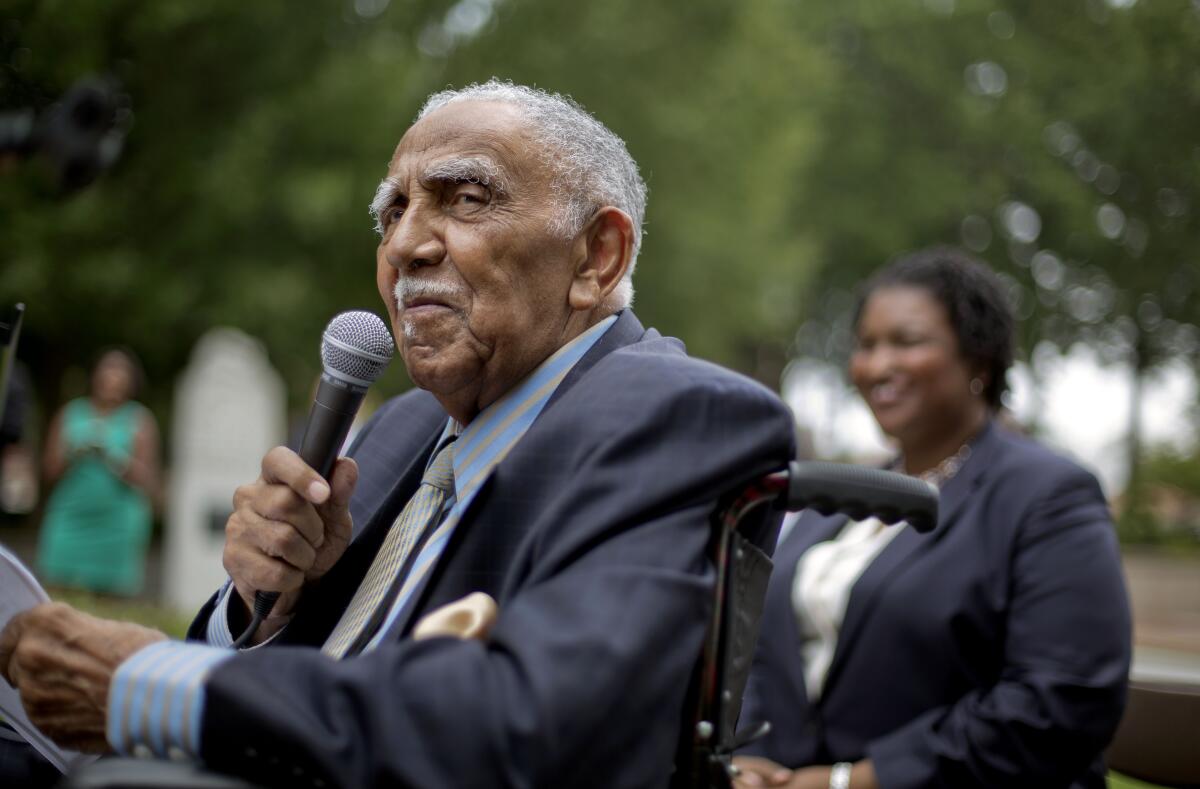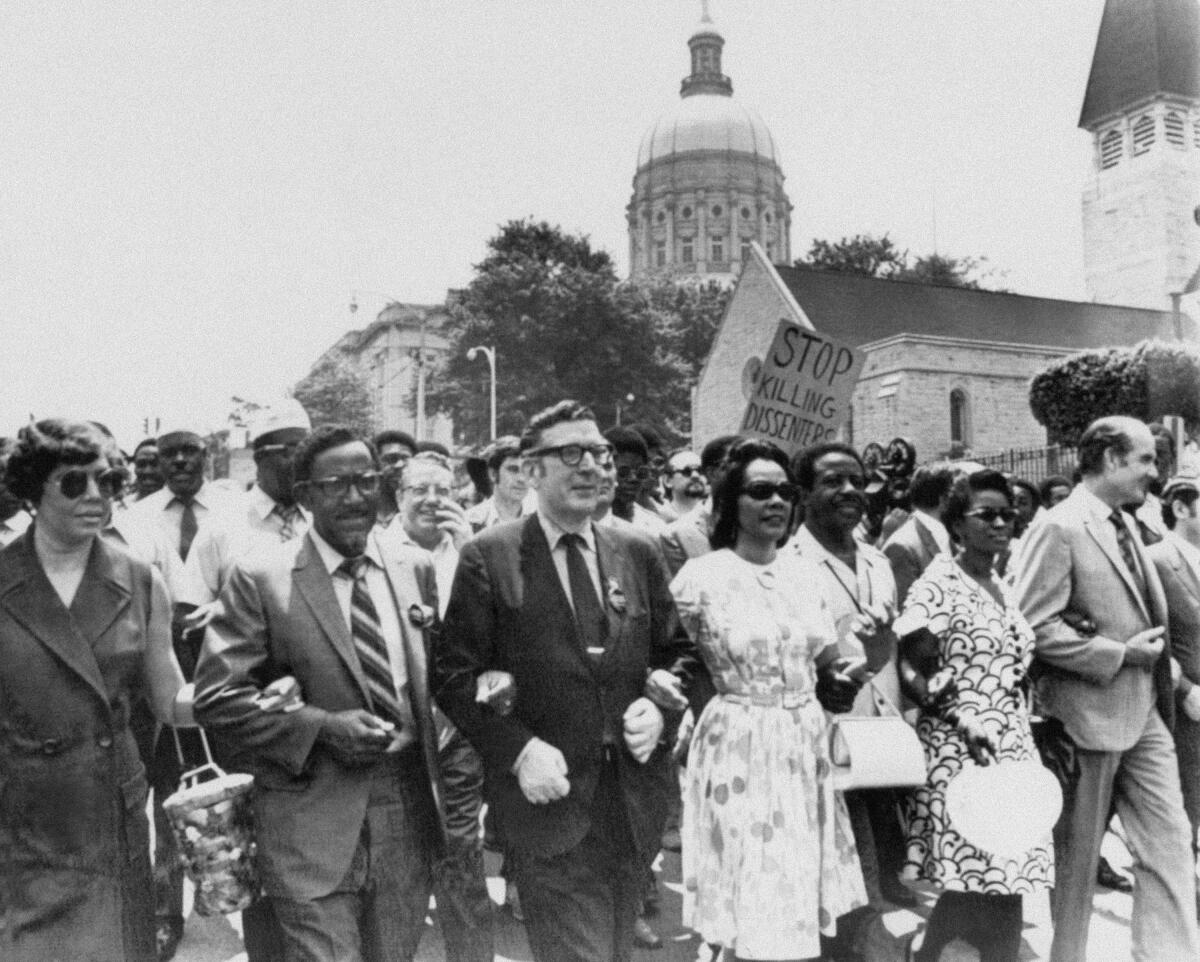Rev. Joseph Lowery, co-founder of Southern Christian Leadership Conference, dies at 98

- Share via
The Rev. Joseph E. Lowery, a stalwart of the civil rights movement who co-founded the Southern Christian Leadership Conference with the Rev. Martin Luther King Jr. and led the organization for 20 years, has died. He was 98.
Lowery died Friday at his home in Atlanta surrounded by family members, they said in a statement to the Associated Press. He died from natural causes unrelated to the coronavirus outbreak, the statement said.
Although he was not one of King’s closest advisors, Lowery emerged as one of the movement’s sturdiest leaders in the decades following King’s 1968 assassination. He took over the reins as president of the SCLC in 1977, when the organization was in disarray, and refocused it on economic and other issues, such as AIDS education, the protection of African American workers’ rights and getting guns off the street. He was one of the last of the group’s founding ministers to lead it, succeeding King and the Rev. Ralph Abernathy.
Known as a powerful and witty orator, Lowery won new admirers in 2009 when he delivered a rousing benediction at the inauguration of President Obama. Later that year, Obama awarded the retired Methodist preacher the Medal of Freedom, calling him “a giant of the Moses generation of civil rights leaders.”
Also noteworthy is the little-known role Lowery played in Sullivan vs. New York Times, a landmark 1st Amendment case in which Lowery was a named defendant. The case, ultimately decided by the U.S. Supreme Court, established malice as a standard for proving libel cases lodged by government officials.
Lowery was born Oct. 6, 1921, in Huntsville, Ala., where his father ran a grocery store. In an interview with Juan Williams for the book “My Soul Looks Back in Wonder: Voices of the Civil Rights Movement,” Lowery recalled a pivotal experience when he was 13 and nearly collided with a white police officer entering the store. “He punched me in the stomach with his night stick and said, ‘Get back, nigger! Don’t you see a white man coming in the door?’“ Lowery said. He ran home to fetch a gun but his father intercepted him and took him to the police chief, who listened to their complaint but said there was nothing he could do.
“That planted a seed in me,” Lowery said. “It’s a wonder it didn’t make me hate .... After I went into the ministry, I realized my call to preach involved social justice as much as it did heaven.”
He became the pastor of a Methodist church in Mobile, Ala., in 1952, after studying at several colleges, including Knoxville College in Tennessee, Payne Theological Seminary in Ohio and Chicago Ecumenical Institute. Soon he joined other ministers in challenging the Jim Crow laws that limited blacks’ access to public transportation. He began to meet monthly with other activist preachers in Montgomery, where Rosa Parks’ defiance of a white bus driver and subsequent arrest sparked the Montgomery bus boycott and the 1956 outlawing of racial segregation laws for buses. The SCLC was born the following year.

In 1960, Lowery’s name appeared in a New York Times ad soliciting funds for King’s defense against an Alabama perjury charge. The ad characterized King’s indictment as part of a concerted effort by white Southern officials to “behead” the civil rights movement and demoralize its supporters.
Although the ad mentioned no officials by name, it provoked a series of lawsuits from Alabama officials claiming injury to their reputations. The first plaintiff was Montgomery Police Commissioner L.B. Sullivan, who sued the New York Times and four of the signatories who lived or owned property in Alabama: Lowery, Abernathy and two other black ministers, Fred Shuttlesworth and S.S. Seay Sr. An all-white jury found in favor of Sullivan and awarded him $500,000, the largest libel judgment in Alabama’s history.
To pay the judgment, the state confiscated the ministers’ personal property, including Lowery’s 1958 Chrysler. “They sold my car at auction for $800,” Lowery said in Anthony Lewis’ 1991 book “Make No Law: The Sullivan Case and the First Amendment.”
His car was returned after a member of his church bought it at auction and sold it to Lowery’s wife, Evelyn, for $1. After the Supreme Court reversed the Sullivan judgment in 1964, the state refunded the $800, which Lowery donated to the movement.
Lowery had faced financial ruin from the lawsuits; some SCLC leaders left the South to avoid such persecution. “Alabama tried to bankrupt the civil rights movement by using the power of its courts,” historian Taylor Branch said in an interview with The Times. “Lowery is often not recognized for his role, but it was important. He was a named defendant in a case that still defines 1st Amendment limits of political argument in the United States.”
In 1965, King asked Lowery to head a delegation of voting rights protesters marching from Selma, Ala., to Montgomery to deliver a list of demands to Alabama’s fiercely segregationist governor, George Wallace. The first march had ended in “Bloody Sunday,” when state troopers met the demonstrators with billy clubs and tear gas on the Edmund Pettus Bridge, just six blocks from the marchers’ starting point in Selma. The second attempt two days later ended on the same bridge when King turned the marchers back toward Selma to comply with a federal restraining order.
Success came on the third march, with 25,000 supporters massing at the state Capitol in Montgomery on March 25, 1965, to hear King speak. Five months later, President Johnson signed the historic Voting Rights Act of 1965.
The president heeded the marchers’ demands but Wallace did not. When Lowery and his delegation waded through National Guard soldiers and state troopers to reach the door of the Capitol, they were met by a Wallace aide, who said the governor would not see them. Lowery refused to hand over the petition to the aide and left.
In 1995, when the SCLC sponsored a 30th-anniversary reenactment of the 50-mile march, the civil rights leader and the old segregationist finally came face to face, but this time the former governor, in a wheelchair from a 1972 assassination attempt, welcomed Lowery and the marchers to Montgomery. At a ceremony at a school, an aide read a conciliatory statement from Wallace urging that the lessons of the original march “never be forgotten.”
Although it fell short of a direct apology, the statement was interpreted as one by Lowery.
“The arc of the universe bends toward justice,” Lowery said later. “I thanked George Wallace for his act of courtesy. Marchers applauded his welcome. We could not, would not, deny him an act of repentance. We serve a God who makes the crooked places straight, makes the desert bloom and makes the lion to lie down with the lamb. There was an air of regeneration and caring in those moments. Isn’t that what the world needs now?”
Lowery, who in 1998 founded another advocacy group, the Georgia Coalition for the Peoples’ Agenda, is survived by three children and several grandchildren. His wife, Evelyn, who founded the women’s empowerment group SCLC/WOMEN Inc., died in 2013.
More to Read
Start your day right
Sign up for Essential California for the L.A. Times biggest news, features and recommendations in your inbox six days a week.
You may occasionally receive promotional content from the Los Angeles Times.








